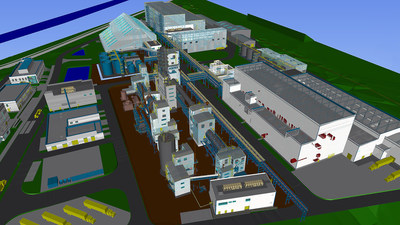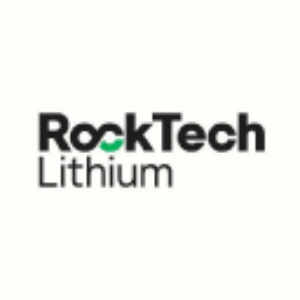Rock Tech Lithium completes Bankable Project Study for its Guben Converter Project
Rhea-AI Summary
Rock Tech Lithium announced the completion of a bankable project study for its lithium hydroxide converter in Guben, Germany. The study indicates a pre-tax NPV of USD 1.219 billion and an IRR of 24%. Initial capital costs are estimated at USD 683 million, with a projected annual lithium production capacity of 24,000 tonnes. The project is set to begin construction in Q1 2023, aiming for commissioning in Q2 2025. This facility is crucial for meeting rising lithium demand due to the EU's drive towards electric vehicles, significantly impacting regional supply chains.
Positive
- Pre-tax NPV of USD 1.219 billion, a 183% increase from previous estimates.
- IRR estimated at 24%, indicating strong project profitability.
- Initial capital costs estimated at USD 683 million, aligning with strategic financial planning.
- Annual production capacity of 24,000 tonnes of battery-grade lithium hydroxide.
- Projected revenue of USD 14.872 billion over the project's life, enhancing long-term financial outlook.
Negative
- Increased lead times for major equipment affecting project timelines.
- Higher estimated capital and operating costs due to inflation and supply chain disruptions.
News Market Reaction 1 Alert
On the day this news was published, RCKTF gained 5.84%, reflecting a notable positive market reaction.
Data tracked by StockTitan Argus on the day of publication.
VANCOUVER, BC, Nov. 4, 2022 /PRNewswire/ - Rock Tech Lithium Inc. (TSX-V: RCK) (OTCQX: RCKTF) (FWB: RJIB) (WKN: A1XF0V) (the "Company" or "Rock Tech") is pleased to announce the completion of a bankable project study ("BPS") for the construction and operation of the Company's proposed battery grade merchant lithium hydroxide monohydrate converter and refinery facility (the "Converter" or "Project") in Guben, Germany. The results of the BPS which was conducted in collaboration with Wave International Pty and the Company's Finnish engineering partner show a significant improvement in the Converter's economics compared to the previous engineering study ("Converter Engineering Study"), released on November 29th 2021, and are expected to form the basis for the project financing discussions with potential lenders.
- Estimated Pre-Tax NPV (
8% discount rate) of USD 1,219m - Estimated Pre-Tax IRR of
24% - Estimated initial capital costs of approximately USD 683m
- Estimated nameplate annual lithium hydroxide monohydrate (LHM) production capacity of 24,000 tonnes
- Estimated C1 Plant Operating Cost of USD 4,752/t of LHM produced
- Estimated revenue of approximately USD 14,872m over 25-year life of project
- Early construction works are anticipated to begin in Q1'2023
- with start of commissioning planned from Q2'2025
Rock Tech's planned merchant LHM Converter in Guben, Germany is anticipated to be the first European lithium converter, with capacity to produce 24,000 tonnes of battery grade lithium hydroxide per year, a raw material urgently needed by the battery and automotive industries. The importance of lithium hydroxide is supported by the European Union's recent agreement to effectively ban the sale of new combustion engine vehicles from 2035. Such ban will reshape the European mobility sector and further accelerate EV production, leading to an increased demand for lithium hydroxide.
Rock Tech's plant will be located in Guben, Brandenburg (DE). As announced in October 2021 the Company purchased a site within the existing Guben South industrial park. The site which covers a total of 12 hectares offers excellent accessibility by road and rail. Additionally, key suppliers and customers reside in the region which is expected to become one of the leading battery and EV clusters in Europe. Transparent federal legislation and comprehensive state subsidy schemes further add to the region's attractiveness. The Converter is designed to process spodumene concentrates into battery grade LHM via the sulphation-causticisation (S-C) route. The basic process flowsheet was selected in the previous phase of the Project and was subsequently optimised using data supplied by equipment vendors and metallurgical test work completed during the study.
"Our Guben Converter is an exceptional project as it will help address the increasing need for battery-grade lithium hydroxide. Additionally, it will strengthen regional supply chains by offering a processing route for spodumene concentrates in Europe." Dirk Harbecke, Rock Tech's CEO stated.
The Company is very pleased that the technical and economic results of the BPS support the Company's strategy of building a converter in Germany. Although the BPS uses more conservative costing assumptions than the Converter Engineering Study, it estimates an increase in NPV and of project IRR. The BPS estimates a pre-tax NPV (
"We remain conservative with our price forecasting," Mr. Harbecke explained, "However, if we were to assume the current spot market prices for spodumene and lithium hydroxide remain stable, the pre-tax NPV of our Converter would increase substantially to USD 4,300 million and an IRR of 37.5 per cent"
The results of the BPS demonstrate the potential of Rock Tech's zero waste and ESG strategy, with approximately 96 per cent of the estimated 290,000 tonnes of by-product identified for potential utilization in other industries. Significant efforts have been undertaken to develop use cases for alumino‑silicates, sodium sulphate and gypsum. In line with its conservative costing assumptions, Rock Tech has not yet reflected such opportunities in its revenue estimates.
The city of Guben has commenced preparatory site activities such as grubbing and clearing. Rock Tech is expecting approval of its first partial permit (TG1) in Q4'2022 and the second and last partial permit (TG2) in Q3'2023. As a result of increased lead times for delivery of major equipment from suppliers, early construction works to the extent permitted under TG1 are anticipated to begin in Q1'2023, with start of commissioning planned to commence in Q2'2025.
The BPS was a collaborative study with key contributions from Wave International Pty ("Wave") and the Company's Finnish engineering partner. The BPS demonstrates a high-level engineering definition and cost certainty with AACE Class 3 estimates for capital and operating costs.
The BPS incorporates recent metallurgical test work, including vendor test work conducted for key process packages using spodumene feedstocks from a range of prospective suppliers, resulting in a more robust process design.
Additionally, the BPS describes a path forward to realize value-add opportunities for the Converter residues, which are envisioned as in-demand feedstocks for the domestic building and construction industries.
Rock Tech also recognizes the risks associated with supply chain disruptions due to the impacts of the ongoing war in Ukraine, the COVID-19 pandemic, fluctuating currency exchange rates and energy prices, and an inflationary global marketplace. In an effort to manage such risks and provide a robust financial outlook for the Converter; such risks were taken into account when preparing the BPS. This resulted in an increase in capital expenditure and operating cost estimates for the Converter compared to the Converter Engineering Study. In addition, the start of commissioning of the Project has been moved to Q2'2025 to account for such evolving social, economic, and geopolitical risks.
Rock Tech is currently embarking on a Front-End Loading Stage 3 (FEL3) study to finalize basic engineering to support a final investment decision.
Key economic results of the BPS are reported below:
KEY METRICS AND ASSUMPTIONS(1,2) | |
Pre-Tax Net Present Value ("NPV")(3) | USD 1,219m |
After-Tax NPV(3) | USD 801m |
Pre-Tax Internal Rate of Return ("IRR") | 24 % |
After-Tax IRR | 19 % |
Payback Period | 4.2 years |
Initial Capital Costs | USD 683m |
Life-of-Project Capital Costs(4) | USD 836m |
Life-of-Project Revenue | USD 14,872m |
Life-of-Project C1 Operating Costs excluding spodumene costs | USD 4,752m |
Average spodumene concentrate price paid USD/t(5) | USD 1,532 |
Average LHM price received USD/t(8) | USD 25,038 |
Notes: (see next page) | |
1. See "Key Assumptions and Sensitivity Analysis" section below for further details. | |
2. Key metrics are calculated on nameplate annual production of 24,000 tonnes of LHM over 25-year life of project (as applicable). | |
3. Discount rate of | |
4. Includes sustaining capital. | |
5. | |
6. Based on market forecasts projected over 25-year life of project. |
The BPS estimates total initial capital costs of approximately USD 683m for the Converter (determined to be within a nominal accuracy of +/-
A breakdown of the estimated initial capital cost is presented in the following table:
ESTIMATED CAPITAL COSTS (1) in USDm | |
Civil works and structural steel | 134.8 |
Equipment | 191.4 |
Piping | 48.6 |
Electrical | 50.9 |
Other | 59.7 |
Subtotal Direct Capital Costs(2) | 485.3 |
EPCM Costs | 89.8 |
Owner's Costs(3) | 39.8 |
Subtotal Indirect Capital Costs(3) | 129.6 |
Subtotal (Direct + Indirect Costs) | 614.9 |
Contingency | 68.3 |
Total Estimated Initial Capital Costs | 683.2 |
Notes: | |
1. Assumes that the Converter is developed using an Engineering, Procurement and Construction Management (EPCM) execution strategy. | |
2. Most direct cost estimates were derived from quotes, tender submissions or statutory requirements. | |
3. Indirect and owner's cost estimates were derived from factors and experience deemed to be reflective of current estimate accuracy. |
Numerous factors, including the continued development of the Converter's engineering design, and recent global market volatility, have resulted in an increased initial capital cost estimate compared to the Converter Engineering Study. Key price escalations have been assumed for plant costs relating to raw material prices, labour costs and energy costs.
Basic engineering design, carried out by technology providers, consultant, and vendors, resulted in an improved engineering definition of the Converter as well as an improved procurement package scoping. The basic engineering design supports an AACE Class 3 capital cost estimate with an accuracy of +/-
The BPS considers increased labour and material costs because of global skilled labour and supply chain disruptions. Rock Tech expects such disruptions to normalize throughout 2023 and has allowed for inflation in the capital cost estimate accordingly. Rock Tech intends to continue to orient its procurement and contracting strategies toward reducing capital cost and execution risk during the FEL3 study.
The average annual operating costs of the Converter are estimated at USD 114m per year (determined to a nominal accuracy of +/-
A breakdown of the estimated average annual operating cost over the life of the Converter excluding the cost of Spodumene Concentrate is presented in the following table:
COST CENTRE | USD/t LHM | USDk/year |
Labour | 526 | 12,630 |
Power | 598 | 14,345 |
Diesel | 49 | 1,165 |
Natural Gas | 157 | 3,764 |
Maintenance | 395 | 9,476 |
Reagents | 1,042 | 25,011 |
Transport and Logistics | 1,011 | 24,256 |
Fixed Costs | 304 | 7,285 |
Waste Disposal | 554 | 13,299 |
Utilities (other) | 118 | 2,828 |
Estimated Annual Operating OPEX(1) | 4,752/t LHM | 114,059 |
Notes: | |
1. Operating costs are calculated on nameplate annual production of 24,000 tonnes of LHM over 25-year life of project. |
The operating cost estimate of the BPS is greater than the operating cost estimate of the Converter Engineering Study with such increase primarily driven by higher estimated maintenance costs, reagent prices, transportation costs, energy cost and by-product disposal costs.
The BPS assumes that the Converter will have a 25-year life span and a nameplate annual production of 24,000 tonnes of LMH from approximately 173,500 tonnes of spodumene concentrate, which is intended to be sourced from third parties and via RTT (as defined below).
The discount rate utilized for financial analysis is
1 Source: Benchmark Mineral Intelligence, Wood Mackenzie | |
2 Source: European Central Bank, Bank of Canada (as of October 27) |
As part of the BPS, a sensitivity analysis was conducted on the Converter's pre-tax NPV and pre-tax IRR to key variables, including spodumene concentrate price and LHM price. Using the base case as a reference, the key variables were changed between +/-
LHM PRICE – SENSITIVITY ANALYSIS | ||||||||
(30 %) | (20 %) | (10 %) | base | +10 % | +20 % | +30 % | ||
NPV – pre tax | (125 %) | (83 %) | (41 %) | | 41 % | 80 % | 119 % | |
IRR – pre tax | 2.5 % | 11.2 % | 18.0 % | 23.8 % | 28.9 % | 33.5 % | 37.6 % | |
SPODUMENE CONCENTRATE PRICE – SENSITIVITY ANALYSIS | ||||||||
(30 %) | (20 %) | (10 %) | base | +10 % | +20 % | +30 % | ||
NPV – pre tax | 58 % | 39 % | 19 % | (19 %) | (39 %) | (58 %) | ||
IRR – pre tax | 31.8 % | 29.2 % | 26.5 % | 23.8 % | 21.0 % | 18.1 % | 15.1 % | |
The Converter is expected to comprise a pyrometallurgical and hydrometallurgical chemical plant that uses various reagents to extract the lithium from spodumene concentrate to produce a purified LHM product.
The process flowsheet has been designed to incorporate process unit operations typical to lithium refineries using the sulphation route. Proven technology within the lithium industry was used to minimise technical risk and time to market. Additional process equipment beyond a traditional flowsheet has been included specifically to give the plant a large operating envelope and thus ability to process a wide range of feedstock.
Lithium recoveries based on analysis of a multi-phase test work program covering a broad variety of spodumene concentrates and as simulated in the mass and energy balance indicates a potential average leach extraction of
The Project is expected to generate approximately 290,000 tonnes of by-products per year. Studies conducted by Rock Tech show that as a result of their chemical composition the vast majority of these non-lithium products have the potential to be utilised in other industries, subject to certain conditions, including government accreditation following commencement of production. In line with Rock Tech's commitment to highest ESG standards, the BPS describes significant efforts which have been undertaken to develop a use case for the following materials, representing
- alumino-silicates (
69% of by-product) – concrete & building industry applications, - sodium sulphate (
15% of by-product) – use markets well established, - gypsum (
12% of by-product) – concrete & building industry applications.
Despite the positive outlook for such by-product use cases the financial results of the BPS do not attribute additional revenue to these by-products, in line with the conservative approach taken in the BPS. The study assumes sodium sulphate anhydrous is a saleable product while all other by-products are assumed to be disposed of in waste management facilities at Rock Tech's expense. Offtake offers and Letters of Intent for by-product disposal have been secured for
To operate the Converter, feedstock, products, by-products, residues, consumables and spare parts must be transported. Initially, spodumene, Rock Tech's main feedstock, is expected to be sourced from mines in Australia or Canada. Therefore, Rock Tech has recently announced to have entered into a definitive agreement to form a joint venture entity with Transamine Holdings and Investments Limited to form RTT Lithium SA ("RTT"), (see the Company's press release dated October 24, 2022). Under the terms of the agreement, RTT will manage the procurement of spodumene concentrate from global mining companies and spodumene producers and arrange related logistical and storage services, Transamine will provide related financing.
Based on the Company's supplier discussions, most other consumables, especially reagents, are expected to be sourced in Germany and transported to the Converter by train or truck.
Rock Tech has selected preferred logistics partners for the full supply chain from Spodumene shipping, port receival and bonded warehousing in the port of Nordenham, rail handing systems and rail transport to Guben. The Company has also selected transport systems and preferred suppliers for all other materials handling requirements inbound and outbound from the Converter site in Guben.
The BPS provides an updated Project schedule compared to the Converter Engineering Study. Site activities have commenced with grubbing and clearing expected to be completed before the end of 2022.
Based on initial submissions to government authorities the permitting process must be completed in accordance with the Federal Immission Control Act of Germany. Rock Tech has agreed that the permitting application will be submitted in two parts:
- TG1 (partial permit 1, submitted in February 2022) covers all site preparation and non-process infrastructure related construction, including submission of an environmental impact assessment and public consultation. The application for TG1 is under review with approval expected by Q4'2022; and
- TG2 (partial permit 2, anticipated to be submitted in November 2022) covers all process plant related construction, including detailed engineering plans, and a further public consultation period, with permit approval expected by Q3'2023.
As a result of increased lead times from major equipment suppliers, early construction works to the extent permitted under TG1 are anticipated to begin in Q1'2023 with start of commissioning planned from Q2'2025.
As the Company moves into the next phase of engineering, the Company's Finnish engineering partner has been engaged to prepare the FEL3 study. During this study, a level 3 resource-loaded execution phase schedule will be developed, incorporating detailed supply and installation schedules obtained from vendors during the competitive tendering phase.
On behalf of the Board of Directors,
Dirk Harbecke
Chairman & CEO
Rock Tech is a cleantech company on a mission to produce lithium hydroxide for EV batteries. The Company plans to build lithium converters at the door-step of its customers, to guarantee supply-chain transparency and just-in-time delivery. To close the most pressing gap in the clean mobility story, Rock Tech has gathered one of the strongest teams in the industry. The Company has adopted strict ESG standards and is developing a proprietary refining process aimed at further increasing efficiency and sustainability. Rock Tech plans to source raw material from its own mineral project in Canada as well as procuring it from other responsibly producing mines. In the years to come, the Company expects to also source raw material from discarded batteries. Rock Tech's goal: to create a closed-loop lithium production system. www.rocktechlithium.com.
Neither the TSX Venture Exchange nor its Regulation Services Provider (as that term is defined in policies of the TSX Venture Exchange) accepts responsibility for the adequacy or accuracy of this release.
The following cautionary statements are in addition to all other cautionary statements and disclaimers contained elsewhere in, or referenced by, this press release.
Certain information set forth in this press release constitutes "forward-looking information" (collectively, "forward-looking information") within the meaning of applicable Canadian securities laws, which information is based on Rock Tech's current expectations, estimates, and assumptions in light of its experience and perception of historical trends. All statements other than statements of historical facts may constitute forward-looking information. Often, forward-looking information can be identified by the use of words or phrases such as "estimate", "project", "anticipate", "expect", "intend", "believe", "hope", "may" and similar expressions, as well as "will", "shall" and all other indications of future tense. All forward-looking information set forth in this press release is expressly qualified in its entirety by the cautionary statements referred to in this section.
In particular, this press release contains forward-looking information pertaining to: expectations concerning the Converter, including the design and features of the Converter, as well as the expected costs, capital expenditures, timing and outcomes thereof; statements regarding the Company's future plans, estimates, and schedules relating to the Converter, including the anticipated timing of future activities taken in support of the development thereof; Rock Tech's expectations regarding the FEL3 study including the related activities, findings and uses thereof; potential financing arrangements; the expected economic performance of the Converter and anticipated production of LHM and related processing methods employed; the estimated capital and operating costs of the Converter; the anticipated timing and outcomes of a final investment decision, construction activities and commissioning of the Converter; statements regarding the Company's sustainability and ESG related goals and strategy, including the benefits and achievement thereof and future actions taken by the Company in relation thereto; expected regulatory processes and outcomes, including in relation to TG-1 and TG-2; expectations regarding non-lithium by-products and the production and uses thereof; expectations regarding the electric vehicle industry, including the demand for and pricing of LMH and the benefits therefrom; Rock Tech's opinions, beliefs and expectations regarding the Company's business strategy, development and exploration opportunities and projects; and plans and objectives of management for the Company's operations and properties.
The forward-looking information contained in this press release also includes financial outlooks and other forward-looking metrics relating the Company and the proposed Converter, including references to financial and business prospects, future results of operations, performance and cash follows (including estimated NPV and IRR). Such information, which may be considered future oriented financial information or financial outlooks within the meaning of applicable Canadian securities laws (collectively, "FOFI"), has been approved by management of the Company as of the date hereof. Such FOFI is based on assumptions which management believes is reasonable as of the date hereof, having regard to the industry, business, financial conditions, plans and prospects of Rock Tech, including the BPS. These projections are provided to describe the prospective performance of the Converter and readers are cautioned that such information may not be appropriate for other purposes. Further, such information is highly subjective and should not be relied on as necessarily indicative of future results and actual results may differ significantly from such projections. FOFI constitutes forward-looking statements and is subject to the same assumptions, uncertainties, risk factors and qualifications as set forth below.
Forward-looking information is based on certain assumptions, estimates, expectations and opinions of the Company and in certain cases, third party experts, that are believed by management of Rock Tech to be reasonable at the time they were made. This forward-looking information was derived utilizing numerous assumptions regarding, among other things: regulatory decisions and outcomes; anticipated construction costs, schedules and completion dates; access to capital markets and other sources of financing; the supply and demand for, deliveries of, and the level and volatility of prices of, intermediate and final lithium products; future exchange and interest rates; general business and economic conditions; the costs and results of development, exploration and operating activities; Rock Tech's ability to procure supplies and other equipment necessary for its business; and the accuracy and reliability of technical data, forecasts, estimates and studies. The foregoing list is not exhaustive of all assumptions which may have been used in developing the forward-looking information. While Rock Tech considers these assumptions to be reasonable based on information currently available, they may prove to be incorrect. Forward-looking information should not be read as a guarantee of future performance or results. In addition, forward-looking information involves known and unknown risks and uncertainties and other factors, many of which are beyond Rock Tech's control, that may cause actual events, results, performance and/or achievements to be materially different from that which is expressed or implied by such forward-looking information. Risks and uncertainties that may cause actual events, results, performance and/or achievements to vary materially include: the cost and availability of, and inflationary pressure on, labour, equipment and materials; the Company's ability to access funding required to invest in available opportunities and projects (including the proposed Converter) and on satisfactory terms, the current and potential adverse impacts of the COVID-19 pandemic and ongoing geopolitical hostilities; the risk that Rock Tech will not be able to meet its financial obligations as they fall due; adverse changes in commodity prices, exchange rates and market prices of Rock Tech's securities; Rock Tech's ability to attract and retain skilled staff and to secure feedstock from RTT and third party suppliers; unanticipated events and other difficulties related to construction, development and operation of the Converter, the cost of compliance with current and future environmental and other laws and regulations; title defects; Rock Tech's history of losses; adverse impacts of climate change and other risks and uncertainties described from time to time in Rock Tech's public disclosure documents available on the Company's SEDAR profile at www.sedar.com, including those discussed under the heading "Risk Factors" in Rock Tech's most recently filed Management Discussion and Analysis and Annual Information Form, respectively. Such risks and uncertainties do not represent an exhaustive list of all risk factors that could cause actual events, results, performance and/or achievements to vary materially from the forward-looking information. We cannot assure you that actual events, results, performance and/or achievements will be consistent with the forward-looking information and management's assumptions may prove to be incorrect.
Forward-looking information reflects Rock Tech management's views as at the date the information is created. Except as may be required by law, Rock Tech undertakes no obligation and expressly disclaims any responsibility, obligation or undertaking to update or to revise any forward-looking information, whether as a result of new information, future events or otherwise, to reflect any change in Rock Tech's expectations or any change in events, conditions or circumstances on which any such information is based. Given these uncertainties, readers are cautioned not to rely on the forward-looking information set forth in this press release.
Disclaimer. The BPS does not constitute a preliminary economic assessment, preliminary feasibility study or feasibility study within the definitions adopted by the Canadian Institute of Mining, Metallurgy and Petroleum, as it relates to a standalone lithium hydroxide converter and does not concern a mineral project of Rock Tech. As a result, disclosure standards prescribed by National Instrument 43-101 – Standards of Disclosure for Mineral Projects are not applicable to the scientific and technical information included in the BPS or this press release.
![]() View original content to download multimedia:https://www.prnewswire.com/news-releases/rock-tech-lithium-completes-bankable-project-study-for-its-guben-converter-project-301668625.html
View original content to download multimedia:https://www.prnewswire.com/news-releases/rock-tech-lithium-completes-bankable-project-study-for-its-guben-converter-project-301668625.html
SOURCE Rock Tech Lithium Inc.








